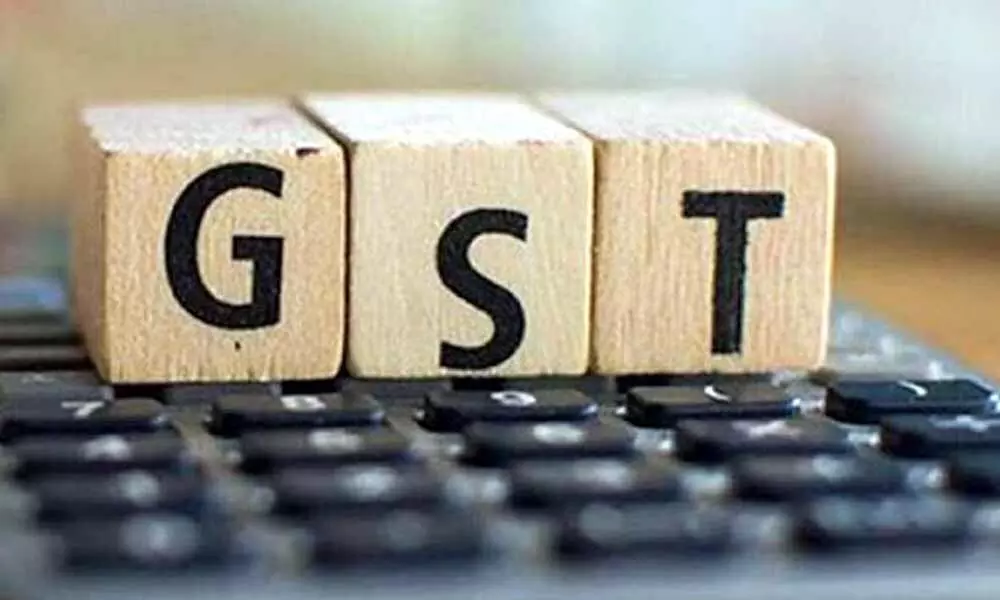Live
- Gold rates in Vijayawada today surges, check the rates on 22 November, 2024
- Gold rates in Visakhapatnam today surges, check the rates on 22 November, 2024
- Satya Kumar flays YSRCP govt for ruining new med colleges
- AP High Court to hear RGVs anticipatory bail plea in social media remarks case
- ICC Champions Trophy: PCB appoints Chief Operating Officer; reiterates stand to host Champions Trophy entirely in Pakistan
- Probe initiated after food poisoning incident
- BGT 2024-25: Nitish Kumar Reddy, Harshit Rana make India Test debuts in first Border-Gavaskar Trophy in Perth
- 100 students fall sick after consuming contaminated food
- TCS will commence ops in Visakha in 3 months: Lokesh
- Pawan, 2 other ministers rule out VSP privatisation
Just In
GST Council law panel to finalise amendment to law related to fake invoices


GST Council law panel to finalise amendment to law related to fake invoices
An urgent meeting of the Law Committee of the GST Council will be convened on Wednesday in the national capital to discuss in detail the issue of fake GST invoice
New Delhi: An urgent meeting of the Law Committee of the GST Council will be convened on Wednesday in the national capital to discuss in detail the issue of fake GST invoice frauds and further tightening of the GST registration process and work out other legal measures, including necessary law amendment required in the GST Act, to do away with the menace of fake invoicing, Finance Ministry sources said here on Monday.
According to Finance Ministry sources, the meeting is part of the nationwide drive against the fake GST invoice frauds under which in last four days, the Directorate General of GST Intelligence (DGGI) has arrested 25 persons, including two professionals, and identified about 1,180 entities and booked 350 cases against unscrupulous elements involved in availing and passing on ineligible input tax credit (ITC) fraudulently.
The crackdown, which was carried out from November 9-13, has been resumed on Monday after Diwali recess.
Finance Ministry sources said that the fake invoices were not only issued for availing or passing on ITC, but were also used as conduit for nefarious activities leading to tax evasion, massive bank loan fraud, money laundering and hawala transactions. This will have very serious impact on the economy in the long run.
These activities have been largely carried out by non-existent or fly-by-night firms and by using a network of firms to usurp ITC on commission basis.
Sources acknowledged that these activities have been carried out primarily by those unscrupulous elements who have exploited the ease of doing business conveniences in the existing system by getting a GST registration easily and quickly and later take advantage of the liberalised norm for grant of registration in GST.
Sources said that the GST Council's Law Committee would consider the impact of the issuance of fake invoices and strict action required under the GST law to curb these activities.
The committee would also do some out of the box thinking on this issue as at present the only way to curb this illegal activity is to identify the chain of entities involved in the issuance of fake invoices and availment of credit and take strict action against them for preventing such fraud, including arresting the masterminds who run the whole network of firms and indulge in passing on fake credit.
Finance Ministry sources said that the committee would deliberate on the measures that are required to plug the loopholes in the law which are being exploited by the unscrupulous elements to defraud the exchequer.
It is learnt that the Finance Ministry is in the process of plugging the gaps in the GST registration process to ensure that only genuine businesses get a GST registration and those which have the intent to defraud the system are purged out at the registration stage itself.
Sources explained that the businesses, whose owners or promoters do not have commensurate financial track record, like filing of income tax returns and payment of income tax to the government, may require detailed physical and financial verification by tax officers, before their companies can be considered for GST registration.
The provisions related to deemed registration under the GST law may also be tightened to prevent misuse of such provisions by fake dealers.
Besides, the provisions related to suspension of registration may also be streamlined to make the procedure of suspension and cancellation of registration more efficient and faster, so that such fraud operators can be prevented in time from continuing to pass on fake credit down the chain, added a source.
It is also learnt that data analytics techniques will be used to identify such taxpayers, who are suspected to be indulging in fraudulent activities, and a coordinated action is likely to be taken against such elements by suspending their registration, followed by detailed physical and financial verification by field officers to check the genuineness of their operations, before they are allowed to reuse their registration.

© 2024 Hyderabad Media House Limited/The Hans India. All rights reserved. Powered by hocalwire.com






